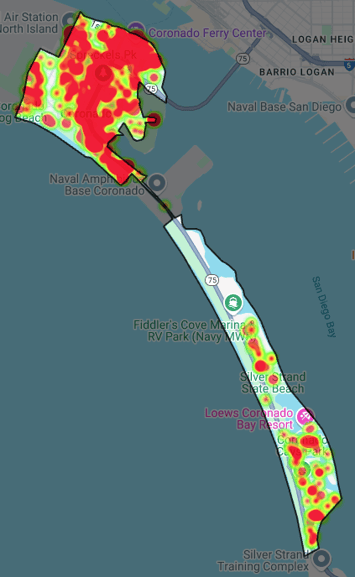Coronado’s Climate Commitment in Motion: Microtransit for a Low-Carbon Future

Industry
Government
Eco-friendly transit need
Coronado’s 2022 Climate Action Plan created urgency to adopt sustainable initiatives, particularly targeting the reduction of greenhouse gas emissions and local traffic congestion caused by high volumes of short-distance car trips.
Community Mobility Pilot Success
Popularity among residents and visitors drove high ridership and industry leading cost-efficiencies, all while avoiding GHG emissions and reducing congestion through ride pooling.
Pilot Length
June - October 2024
"This service has been so helpful and is truly given me back time and energy to save me from driving my vehicle and intense parking hustles! I really hope we continue to have this amazing service that helps not only visitors to Coronado, but the committed and valued residence of Coronado. Thank you!!"
Local Resident
"This service is fantastic for local businesses, as it increases foot traffic without the need for extra parking."
Local Resident

The City of Coronado
Coronado, a coastal city famed for its beautiful beaches and the historic Hotel del Coronado, has a population of around 23,000 but welcomes over 2 million visitors annually. Recently, the City has been making great strides to address community needs by committing to 900+ new affordable housing units, revitalizing downtown infrastructure, implementing new e-bike safety regulations, and advancing emission reductions through the approval of its Climate Action Plan in 2022.Coronado's Climate & Transit Goals
In response to the escalating environmental concerns within the region, the City of Coronado developed a Climate Action Plan in March 2022 with a bold target to reduce community-wide greenhouse gas emissions by 40% by 2030. This plan underscored the urgency to adopt sustainable initiatives, particularly targeting the reduction of greenhouse gas emissions and local traffic congestion caused by high volumes of short-distance car trips. With growing traffic pressures, especially during peak tourism seasons, Coronado recognized an immediate need to adopt an eco-friendly, convenient transit solution that would not only alleviate congestion but also contribute to a cleaner, quieter community environment.
Furthermore, the City faced the challenge of promoting an accessible and equitable transit alternative for all residents and visitors. The city sought a system that would complement existing transit options, connect neighborhoods, reduce parking demands, and improve air quality without adding further strain on public resources.
Community Mobility as a Solution
In selecting a sustainable transit option, Coronado’s decision-making process focused on finding an eco-friendly, accessible solution to reduce car dependency and alleviate traffic congestion. Having observed Circuit’s successful implementations in similar California markets, Coronado’s planners were drawn to the service’s environmentally friendly, adaptable design and community-centered approach.
Circuit’s electric, low-speed vehicles were uniquely suited to Coronado’s local transportation needs, offering an immediate solution for short, in-town trips without requiring extensive infrastructure. Circuit’s model addressed the “first-and-last mile” challenge, connecting residents and visitors to key local destinations while reducing reliance on personal vehicles.
In 2023, Coronado launched a six-month pilot program with Circuit to test the shuttle’s impact on mobility and emissions. The pilot quickly highlighted the value of Circuit’s accessible, zero-emission transit solution for local trips. With an easy-to-use app for ride requests, real-time tracking capabilities, and a team of local driver ambassadors, Circuit delivered a seamless, flexible transit experience tailored to Coronado’s community needs. By using data collected throughout the pilot, Coronado and Circuit could adjust routes and service hours to best serve riders, responding directly to real-time demand.
This partnership enabled Coronado to reduce single-occupancy vehicle trips and provided an effective alternative that supports both environmental goals and community mobility, making daily travel simpler and more sustainable for residents and visitors alike.
Pilot Success
Circuit’s on-demand microtransit service has delivered impactful results for Coronado, providing a reliable and sustainable transportation solution that has been embraced by the community. Over 50,000 passengers have used Circuit’s service, highlighting its role in reducing traffic congestion and providing an attractive alternative to car trips. Key performance and survey data underscore the success and positive reception of the program:

- High Ridership and Cost Efficiency: With per rider costs as low as $7.88, Circuit’s service ison track to deliver over 50,000 rides while remaining cost-effective forthe city.
- Convenient Service Experience: Most riders (74%) waited less than 10minutes for a shuttle, ensuring prompt, reliable service with an average wait time of just 9.6 minutes.
- Enhanced Mobility for Various Trip Purposes: Survey results showed that riders used Circuit’s shuttle for a range of activities—46% for leisure, 27% for dining, and the remainder for errands, shopping, and work. This versatility reinforces the service’s value as a practical option for everyday travel.
- Environmental Impact and Emission Reduction: Circuit’s service has already contributed to a GHG savings of 17.36 metric tons within the first four months of operation, as riders opted for the electric shuttle over personal vehicles. With 32% of surveyed riders indicating they would have driven a car if Circuit’s service wasn’t available, the program significantly reduced emissions and eased demand on parking resources.
- High Satisfaction Rates: The service achieved a 4.8 out of 5 average satisfaction rating, with 88% of riders feeling "very safe" during their trips. This high rating reflects the community’s trust in the service and the positive experience it delivers.
With these results, Circuit’s microtransit program has not only helped Coronado reduce traffic and parking pressures but has also aligned with community needs and preferences, making it an essential part of local transit infrastructure.




